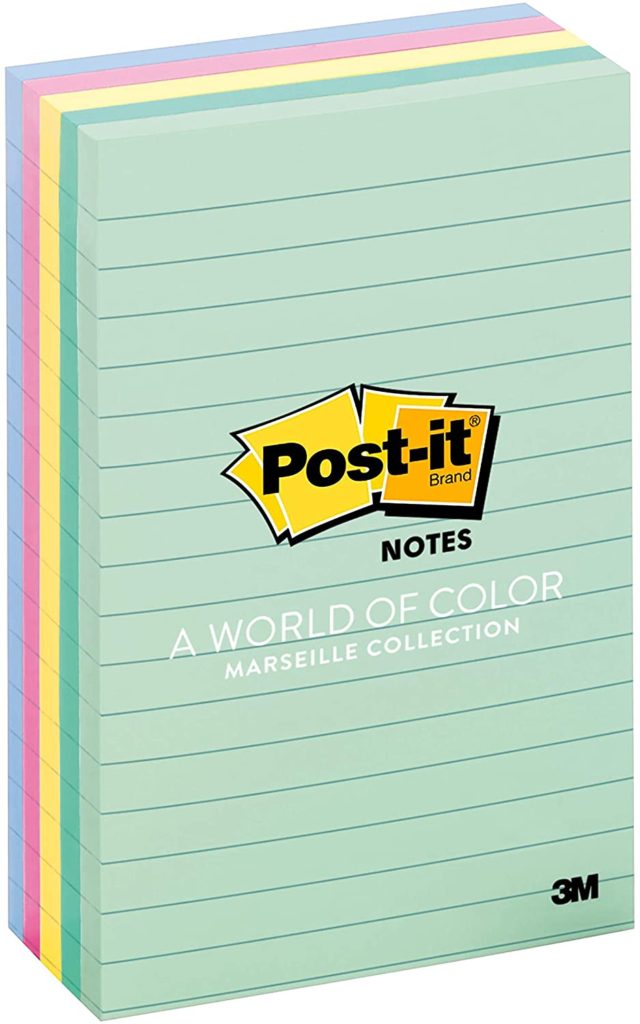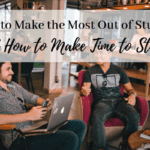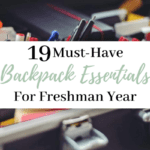How To Study Effectively | How To Study In College
This post shows you how to study effectively in college.
Some of the links below are affiliate links, meaning, at no additional cost to you, I will earn a commission if you click through and make a purchase. See our full disclaimer here.

Your college education is likely to be the hardest you study in your life. Really, you have no option but to give studying your all, or else you’re at risk for failing your classes – and no one wants that!
When you first start studying, you’ll realize that it’s really hard to study a lot of information in a short amount of time. On top of this, you’re super short on time in college. You’re balancing a new start to an independent life, social outings, extracurricular activities, volunteering, and trying to grow your resume.
In this post, I show you exactly how to study to not only get better grades, but to have more time on your hands while you do it! After 5 years of college and 3 degrees, I’ve tried almost every study technique. This post summarizes the best tips and tricks that I know will work for you, too.
Here are the best tips to study effectively in college!
HOW TO STUDY EFFECTIVELY
HOW TO STUDY EFFECTIVELY: SETTING YOURSELF UP FOR SUCCESS
KEEP A CALENDAR OR PLANNER
Keeping a dedicated planner or calendar will change your life. In college, I would say that it’s an absolute essential. When I hear that people don’t keep a planner or calendar, I can almost guarantee that they’re forgetting things and they’re behind.
This way, you’ll know what you have to study, and you’ll have a big heads up on assignments that will take more time.
TAKE READINGS SERIOUSLY – ACTIVELY READ!
As you get further and further into your education, you need to make sure that you’re really absorbing your readings. In class, you’ll likely be expected to have fully read the materials, and be able to call on it through class.
On top of that, when you’re studying for exams, you’ll find that you’re actually saving time in the long run. When you took the time to fully engage with the material and learn it, you’ll soon realize that you don’t need to spend as much time studying.
ASK FOR CLARIFICATIONS AS SOON AS YOU’RE CONFUSED
When you first learn something, it’s normal to be generally confused. However, if you’re completely lost, make sure that during class you’re able to start understanding this material. If, during class, you still don’t get it, ask! Your professors and TAs are there to help. Utilize them!
RELATED: COLLEGE NOTE TAKING TIPS | HOW TO TAKE NOTES FROM A COLLEGE SENIOR
PLAN WAY AHEAD FOR EXAMS AND PROJECTS
I cannot stress how much this one will save you. Project due in two weeks? Start working now! Then, when you come across crazy roadblocks, you’re able to ask for help. Plus, you have a lot more time to review, which is where you’ll catch all of your mistakes.
UTILIZE UNIVERSITY RESOURCES FOR EXTRA HELP
Can you believe I was in my third year of college before I started realizing that there were tons of resources on campus to help me with my education. On your campus, you are likely to be able to get all of your papers read by an English grad student, and get on demand tutoring help for any of your subjects.
Search your universities website to see all of the resources they have to offer! A good place to check is your Universities library page.
RELATED: COLLEGE CLASSES – HOW TO STAY PRODUCTIVE BETWEEN THEM
HOW TO STUDY EFFECTIVELY: IN CLASS HABITS
FIRST – SHOW UP!
Go to class, pay attention, and sit up front! Without doing these things, you immediately put yourself at a disadvantage. Remember, college courses are created by your professors who are teaching these materials, which mean they have an image in their head of a student who succeeds. This student likely does everything the professor recommends, so do just that!
PRACTICE ACTIVE LISTENING
Active listening is really similar to active reading. You’re a lot more alert, and you try to interact with the medium (textbook, lecture, etc) as much as possible. This doesn’t mean you need to ask questions all throughout class, but it does mean that you should be taking detailed notes and asking questions when you’re confused.
A great trick for active listening is sitting at the front of the classroom. I really like this method, because when you speak up in class you can’t see all of the people behind you, which really helps with any anxiousness about speaking in class.
PARTICIPATE!
Okay, I don’t mean be that person that answers everything your professor is asking. When I say participate, I mean volunteer once in a while when answers to questions are asked, and make sure that you’re being an active small group participant. All of these things really help with learning that material, as well as staying on your professors good side. Both of these things equal a fantastic grade!
TAKE NOTES
If you can, try to take notes on paper, or writing, such as though an iPad. While typing notes can be really simple, recording notes in handwriting is scientifically proven to help you retain information. If you’re not sure which works best for you, try a combination, and see which one you find easier or more beneficial. Stick with what works!
RELATED: 9 TIPS FOR BEATING EXAM STRESS | EXACTLY HOW TO PREPARE FOR EXAMS – FROM A COLLEGE SENIOR
REVIEW KEY CONCEPTS IMMEDIATELY AFTER CLASS
This one is a game changer. If you have a break between classes, dedicate 10-15 minutes to reviewing what you just learned in class. One of the ways you could do this is through highlighting your notes, or expanding on terms and concepts using lined sticky notes (a must! Linked below.)


HOW TO STUDY EFFECTIVELY: CHOOSING A STUDY SPACE
THE SPACE DOES NOT MATTER
When picking a study space, know that the actual “space” does not matter. This space could be your kitchen table, or the quietest floor of the University library. Pick a space that works for you!
When you decide on a space that you can be productive and distraction free in, make sure that you only use this space for studying. A big mistake college students make is studying in their beds, or on their couches. While this is more comfortable, your brain needs a dedicated space to understand “work mode” vs. “relax mode.”
SWITCH IT UP
Another misconception about study spaces is that it has to be one dedicated space. While making sure not to mix spaces such as studying and sleeping, it’s important to note that you don’t have to have one study space. Maybe when you’re at the University you’ll study in the library, and when you’re at home you’ll study in the kitchen. Whichever spaces you choose, just make sure that you use them only for studying, and you keep them distraction free.
RELATED: HOW TO ACE ONLINE CLASSES | 13 OF THE BEST TIPS FOR ONLINE CLASS ORGANIZATION
KEEP DISTRACTIONS OUT
Eliminating distractions is probably the most important thing to do when studying. This can be really hard, but work on making a habit out of it. For some people, even listening to music with no words rather than music with words is what they need for a complete distraction-free environment. You’ll be surprised how many things in your space are actually distracting, and when you eliminate them, how much more productive you are able to be.
HOW TO STUDY EFFECTIVELY: STUDYING
POMODORO METHOD
The Pomodoro Method has proven to work wonders for tons of college students. It’s also super easy, which makes this method so achievable.
To practice the Pomodoro Method, you study intensely in 25 minute intervals, taking a 5-10 minute break in between intervals. Then, after 4 rotations of this, you’ll take a longer break. Studying in dedicated sections like this is very motivating, and you’ll discover that you get more done in a smaller amount of time.
GIVE YOURSELF BREAKS
While studying, take as many breaks as you feel are necessary. However, make sure that you are not taking breaks just to procrastinate. To take effective breaks, you could get up and go for a short walk, eat a healthy snack, or do some stretching. Breaks should be short, only 5-10 minutes, to make sure your body and brain do not leave study mode. Then, after a few hours, take a longer break.
RELATED: GENIUS TIPS TO HELP YOU STUDY MORE EFFECTIVELY | 8 GENIUS STUDY HACKS FOR MAXIMUM PRODUCTIVITY
NO MULTITASKING
Multitasking slows you down significantly. Some people (myself included) had an awful habit of watching TV while working on tasks. This is so difficult for your brain! Dedicate time to one task at a time. If you’re dying to watch some TV, save it for your longer break. Remember, the faster you get your studying done, the more time you can spend watching TV or other activities you enjoy, so focus on studying the best you can.
THE IMPORTANCE OF INTENSITY
This one is a little harder to explain. When I study, I can definitely tell the difference between when I’m studying hard, understanding materials, and just getting it done. Other times, I will kind of casually study, and not get much done, and retain little information. Have you experienced what I’m talking about? I bet every college student has!
To make sure you are being productive while you are studying, change your attitude before going into the study session. Hype yourself up. Set reasonable goals for what you’re going to achieve, and achieve those goals. Changing your mentality can make a world of difference in how much you get done, and how well you do it and understand it.
SPACE IT OUT
If you are able to, space out your studying throughout the day. A great way to do this is to study in-between classes or meetings. While this may feel like you’ll just be studying all day every day, studying throughout your day rather than in one big chunk helps to save you time, and helps lessen those times where you will have to study in one big chunk.
RELATED: SCHOOL SUPPLIES YOU NEED FOR 2020-2021 | 19 MUST-HAVE BACKPACK ESSENTIALS FOR COLLEGE
HOW TO STUDY EFFECTIVELY: REVIEWING
REVIEW YOUR NOTES FOR EACH CLASS DAILY
As soon as you finish each class or study session, review everything you just learned. This really helps make sure key concepts are able to stick in your brain, and lessens cram sessions before exams.
KEEP A RUNNING STUDY GUIDE
When you’re reviewing materials, it’s a good idea to dedicate a few pages of your notebook or a few separate sheets of paper as “study guides.” On study guides, you place key concepts with examples, difficult terms and definitions, equations, etc. A study guide is something you continue adding to throughout the semester, and works as a crash course to help you remember information and retain it better. Try to make a goal of reflecting on your study guides every week or so, and adding to them every time you review class materials.
CONNECT OLD CONCEPTS AS YOU LEARN NEW ONES.
Throughout your college course, you’ll keep learning concepts and theories. All of these concepts and theories will intersect with each other – this is especially true for liberal arts majors. I like to try and connect themes and concepts as I review. Keeping a mindset of asking yourself how they can connect comes in so handy when it’s time to put together a long paper or study for an exam.



